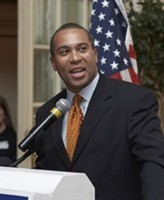
Gov. Deval Patrick last Wednesday issued an executive order setting higher standards for energy efficiency and mandating greater use of renewable energy throughout state government.
State agencies are responsible for consuming more than 1 billion kilowatt hours of electricity, 22 million gallons of heating oil and 46 million therms of natural gas annually, resulting in emission of 1 million tons of carbon dioxide – the equivalent of 200,000 automobiles.
Patrick’s order, titled “Leading By Example,” requires state agencies to reduce their overall energy consumption 20 percent by 2012 compared to 2002 levels, and by 35 percent by 2020. They must also reduce greenhouse gas emissions 25 percent over the next five years, 40 percent by 2020 and 80 percent by 2050.
To achieve those goals, agencies must obtain 15 percent of their electricity from clean renewable sources by 2012 and 30 percent by 2020, use biofuels for 3 percent of heating oil next winter and 5 percent in 2008-09, and meet Massachusetts’s LEED-Plus green building standards for all new construction and major renovations.
In addition, potable water use must be cut by 10 percent over the next five years and 15 percent by 2020.
“In my administration, we intend to practice what we preach,” Patrick said in a news release. “This Executive Order supersedes all previous administrative actions on energy conservation and sets the clean energy bar far higher than ever before.”
Over the April 14-15 weekend, about 170 light bulbs were changed in the governor’s office, and a total of 1,000 bulbs will be changed in the State House, officials said, for projected savings of $15,000 and a reduction of 56 tons in carbon emissions per year.
“Massachusetts is facing an energy crisis,” said House Speaker Sal DiMasi, who accompanied Patrick at the official announcement, as did Senate President Therese Murray.
“As leaders in the Commonwealth,” DiMasi continued, “we must commit ourselves to reform that encourages the use of clean and renewable energy sources, that cuts our dependence on imported sources of fuel and that drives down costs to businesses and consumers. That will only happen with bold action like the steps we take today and by passing meaningful, comprehensive energy reform this session.”
Also last Wednesday, a consortium of electric utilities including NSTAR Electric, National Grid, Cape Light Compact and Western Massachusetts Electric Co. launched a year-long energy efficiency campaign last week aimed at households throughout New England.
Under the slogan “Start Small, Save Big,” the campaign asks consumers to take small steps to reduce their energy consumption and cut the emission of greenhouse gases.
As part of the event, Sylvania, a Massachusetts–based company, donated 1,000 compact fluorescent bulbs for use in state buildings.
“Our commitment to cost and energy savings starts right here – quite literally – in my office,” said Patrick. “We will be making these changes in offices throughout the State House. It’s a small start, but such small starts add up to big savings – in our pocketbooks and for our environment.”
Patrick also issued a proclamation declaring the year beginning April 22 (Earth Day) “The Year of Energy Efficiency.”












